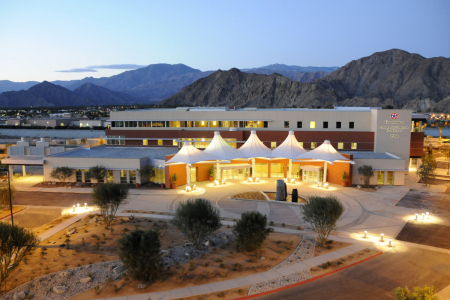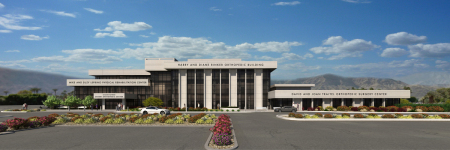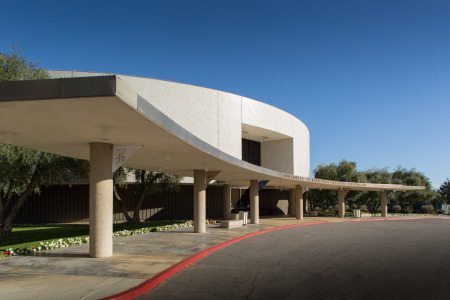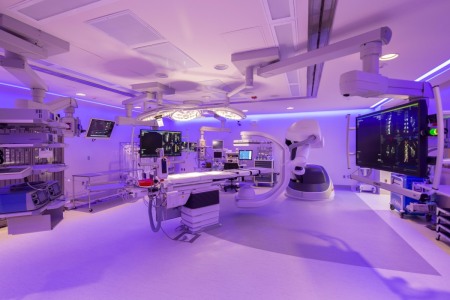Q&A with Martin Massiello, president and CEO of Eisenhower Health
June 28, 2021
by Gus Iversen, Editor in Chief
After serving as chief operating officer for 13 years, Eisenhower Health in Rancho Mirage, California, appointed Martin Massiello as CEO earlier this year. He sat down with HealthCare Business News to tell us a bit about his journey in healthcare, the COVID-19 pandemic, and what makes Eisenhower special.
HCB News: You have recently been appointed president of Eisenhower Health, but have a long history with the health system. What has attracted you to Eisenhower for all these years?
Martin Massiello: Part of Eisenhower Health’s mission statement is to address the changing health care needs of the region and in my 13 years with the organization, that is exactly what we’ve been doing. We developed the ambulatory clinic network with clinics from Palm Springs to La Quinta and in Yucca Valley, making Eisenhower Health a fully integrated health network. As a part of that initiative, we have recruited physicians in primary care and a large number of medical and surgical subspecialties; began and continue to expand a graduate medical education program with residencies in internal medicine, family medicine and emergency medicine, as well as several fellowships; affiliated with a major academic medical center for cancer care; added new technologies; and expanded facilities to accommodate growing patient need, to name just a few examples. It’s easy to stay engaged and excited when you’re part of a forward-thinking health system that engages with community need and makes patient care its true North.
HCB News: What are the biggest differences between your new role as CEO and your previous position as COO?
MM: I was very fortunate to have a mentor and friend in Aubrey Serfling, our previous CEO. Being COO is very much a “boots on the ground” role with responsibility for all health system operations, and interacting with physicians, leaders and staff helped me get to know the organization intimately over the last 13 years. That, combined with having the close working relationship with Aubrey allowed me to actively participate in a number of strategic projects that moved the organization forward, which is one of the primary responsibilities of a CEO. Those experiences prepared me well for my new role and in many ways made it feel somewhat familiar to me from the first day.
HCB News: Who or what inspired you to follow a career in healthcare?
MM: My interest in healthcare began when I was a youngster working as a stock boy in a neighborhood drugstore. The pharmacist who owned the store took me under his wing and that really was the beginning of my interest in pursuing a career in healthcare. I graduated from pharmacy school in 1982 and have had progressive leadership roles in pharmacy and healthcare administration ever since.
HCB News: Can you describe the demographics and patient populations you're serving at Eisenhower?
MM: Eisenhower has long had a large Medicare population (about 70% of our hospital patients are over the age of 70) but in recent years, we have seen a growing number of young families in the Coachella Valley, so our ambulatory division, particularly in primary care, has seen a bit more variety in the age of our patients. Our populations are very much a reflection of the communities around us in terms of ethnicity, LGBTQ and income — we truly care for everyone.
HCB News: What is the leadership environment like?
MM: I’m very proud of our leadership team. As Eisenhower has grown, we have been able to recruit more people with extensive health care knowledge and experience to our workforce, keeping us fresh in our thinking and approach to challenges. Health care is a rapidly changing environment in many areas — best practices, technology, information systems, financials — and our leaders are focused on ensuring Eisenhower is well positioned to address those changes as they arise. The past year has proven that our leaders can put their diverse skill sets to work in a cooperative manner under very challenging circumstances — pivoting quickly as the circumstances of the pandemic changed and ensuring the health system stayed focused on our core values at the same time.
HCB News: Are there any initiatives of special projects you are undertaking, or planning to undertake?
MM: Continued growth is vital to serving our community. I’m planning an extensive expansion of our cardiac and vascular service line in the next few years, including additional procedures not currently offered in the Coachella Valley, greater access for patients, and significant expansion of clinic space, procedural spaces and cardiac rehabilitation space. We are in the planning stages now and I look forward to seeing it come to fruition over the next five years or so. We are also engaged in strategic planning for expansion of our cancer, orthopedic, and surgical services service lines.
HCB News: How is Eisenhower experiencing and responding to COVID-19?
MM: Like health systems around the world, Eisenhower had to adapt to numerous changes over the course of the last fourteen months. From adapting our inpatient floors to create units exclusively for patients with COVID-19, to establishing a COVID-19 testing site for community, to getting a vaccine clinic up and running, Eisenhower has tried to respond to community need as efficiently as possible throughout the pandemic. We are currently fortunate to have a significantly smaller number of patients with the disease and we hope we will not see another spike as more people in the community are vaccinated. It has been exhausting for all of us — personally and professionally — and yet, I saw nothing but dedication and incredible morale from our teams. Our staff are passionate about healing and saving lives and it was heartbreaking for them to see patients die at about double the rate of what we see annually in non-pandemic times. Our nurses not only offered clinical care but also sat with patients to offer comfort because loved ones couldn’t visit them. I couldn’t be more proud or grateful for what all of our staff, physicians and volunteers have done during the pandemic. They made it possible for us to continue giving the level of care our community expects — even during such challenging circumstances. Our nonclinical staff gave tremendous support, ensuring the day-to-day work could continue. Staff continued work on our new Family Birth Center, which is awaiting licensing now, building the IT infrastructure, planning and training. Expansion of our orthopedic center moved forward. Everyone understood their roles in addressing the pandemic and in continuing to look ahead for what the new normal would eventually bring.
HCB News: Do you see healthcare delivery permanently changing in any fundamental ways due to the pandemic?
MM: I don’t really see healthcare delivery changing in significant and permanent ways, but of course, the pandemic was a wake-up call and raised awareness about our readiness to confront this type of global pandemic. If and when the next virus appears and threatens life as we know it, we will be prepared and ready to meet the challenge in ways we couldn’t even imagine prior to the COVID-19 pandemic.
We were surprised by some of the things we learned. For instance, by and large, our community wanted their health care in person when possible. They didn’t embrace virtual appointments as one might expect but that makes sense to me — healing is a very hands-on experience and people want to be reassured that they are seen and heard about matters of their health. We did, however, see people engage with technology by way of their electronic medical record — we use Epic’s MyChart — with much more frequency, which is wonderful. We have offered MyChart for four years and I think patients began to understand the ease of use and benefits of it. We also saw an increase in people wanting to have a primary care physician to quarterback their health care, which is vital to having a healthy community focused on wellness and prevention.
HCB News: Healthcare continues to push away from fee-for-service and toward value-based care. Are you seeing those efforts manifest at Eisenhower?
MM: Yes, we have long been participating in value-based payment programs with Medicare, managed care and commercial insurance plans. While some of these programs are complicated and ever-changing, I have found that they are an important means of keeping our eyes on quality and patient safety metrics that truly add value to the patient care experience. They have also been instrumental in identifying opportunities for improvement in our processes and clinical outcomes, something that Eisenhower Health has always encouraged in our daily management of clinical service lines.
HCB News: Over your 30+ years in healthcare, what is one of the most important lessons you've learned?
MM: I’ve learned many important lessons over the past 30 years but most importantly to remain humble, set a course for the business at hand, identify the organization’s true north and be faithful to its mission and values.
HCB News: You have recently been appointed president of Eisenhower Health, but have a long history with the health system. What has attracted you to Eisenhower for all these years?
Martin Massiello: Part of Eisenhower Health’s mission statement is to address the changing health care needs of the region and in my 13 years with the organization, that is exactly what we’ve been doing. We developed the ambulatory clinic network with clinics from Palm Springs to La Quinta and in Yucca Valley, making Eisenhower Health a fully integrated health network. As a part of that initiative, we have recruited physicians in primary care and a large number of medical and surgical subspecialties; began and continue to expand a graduate medical education program with residencies in internal medicine, family medicine and emergency medicine, as well as several fellowships; affiliated with a major academic medical center for cancer care; added new technologies; and expanded facilities to accommodate growing patient need, to name just a few examples. It’s easy to stay engaged and excited when you’re part of a forward-thinking health system that engages with community need and makes patient care its true North.
The Eisenhower George and Julia Argyros Health Center in La Quinta, California is a 92,000 square-foot health care facility providing a full range of outpatient healthcare services in one of the fast-growing cities in the Coachella Valley.
HCB News: What are the biggest differences between your new role as CEO and your previous position as COO?
MM: I was very fortunate to have a mentor and friend in Aubrey Serfling, our previous CEO. Being COO is very much a “boots on the ground” role with responsibility for all health system operations, and interacting with physicians, leaders and staff helped me get to know the organization intimately over the last 13 years. That, combined with having the close working relationship with Aubrey allowed me to actively participate in a number of strategic projects that moved the organization forward, which is one of the primary responsibilities of a CEO. Those experiences prepared me well for my new role and in many ways made it feel somewhat familiar to me from the first day.
HCB News: Who or what inspired you to follow a career in healthcare?
MM: My interest in healthcare began when I was a youngster working as a stock boy in a neighborhood drugstore. The pharmacist who owned the store took me under his wing and that really was the beginning of my interest in pursuing a career in healthcare. I graduated from pharmacy school in 1982 and have had progressive leadership roles in pharmacy and healthcare administration ever since.
HCB News: Can you describe the demographics and patient populations you're serving at Eisenhower?
MM: Eisenhower has long had a large Medicare population (about 70% of our hospital patients are over the age of 70) but in recent years, we have seen a growing number of young families in the Coachella Valley, so our ambulatory division, particularly in primary care, has seen a bit more variety in the age of our patients. Our populations are very much a reflection of the communities around us in terms of ethnicity, LGBTQ and income — we truly care for everyone.
HCB News: What is the leadership environment like?
MM: I’m very proud of our leadership team. As Eisenhower has grown, we have been able to recruit more people with extensive health care knowledge and experience to our workforce, keeping us fresh in our thinking and approach to challenges. Health care is a rapidly changing environment in many areas — best practices, technology, information systems, financials — and our leaders are focused on ensuring Eisenhower is well positioned to address those changes as they arise. The past year has proven that our leaders can put their diverse skill sets to work in a cooperative manner under very challenging circumstances — pivoting quickly as the circumstances of the pandemic changed and ensuring the health system stayed focused on our core values at the same time.
HCB News: Are there any initiatives of special projects you are undertaking, or planning to undertake?
MM: Continued growth is vital to serving our community. I’m planning an extensive expansion of our cardiac and vascular service line in the next few years, including additional procedures not currently offered in the Coachella Valley, greater access for patients, and significant expansion of clinic space, procedural spaces and cardiac rehabilitation space. We are in the planning stages now and I look forward to seeing it come to fruition over the next five years or so. We are also engaged in strategic planning for expansion of our cancer, orthopedic, and surgical services service lines.
The Annenberg Health Sciences Building is home to Eisenhower Health's Graduate Medication Education program, which includes residencies in Family Medicine, Internal Medicine, and Emergency Medicine as well as Sports Medicine, Pulmonary Medicine and Geriatric Medicine Fellowship Programs and medical school clerkships
MM: Like health systems around the world, Eisenhower had to adapt to numerous changes over the course of the last fourteen months. From adapting our inpatient floors to create units exclusively for patients with COVID-19, to establishing a COVID-19 testing site for community, to getting a vaccine clinic up and running, Eisenhower has tried to respond to community need as efficiently as possible throughout the pandemic. We are currently fortunate to have a significantly smaller number of patients with the disease and we hope we will not see another spike as more people in the community are vaccinated. It has been exhausting for all of us — personally and professionally — and yet, I saw nothing but dedication and incredible morale from our teams. Our staff are passionate about healing and saving lives and it was heartbreaking for them to see patients die at about double the rate of what we see annually in non-pandemic times. Our nurses not only offered clinical care but also sat with patients to offer comfort because loved ones couldn’t visit them. I couldn’t be more proud or grateful for what all of our staff, physicians and volunteers have done during the pandemic. They made it possible for us to continue giving the level of care our community expects — even during such challenging circumstances. Our nonclinical staff gave tremendous support, ensuring the day-to-day work could continue. Staff continued work on our new Family Birth Center, which is awaiting licensing now, building the IT infrastructure, planning and training. Expansion of our orthopedic center moved forward. Everyone understood their roles in addressing the pandemic and in continuing to look ahead for what the new normal would eventually bring.
HCB News: Do you see healthcare delivery permanently changing in any fundamental ways due to the pandemic?
MM: I don’t really see healthcare delivery changing in significant and permanent ways, but of course, the pandemic was a wake-up call and raised awareness about our readiness to confront this type of global pandemic. If and when the next virus appears and threatens life as we know it, we will be prepared and ready to meet the challenge in ways we couldn’t even imagine prior to the COVID-19 pandemic.
We were surprised by some of the things we learned. For instance, by and large, our community wanted their health care in person when possible. They didn’t embrace virtual appointments as one might expect but that makes sense to me — healing is a very hands-on experience and people want to be reassured that they are seen and heard about matters of their health. We did, however, see people engage with technology by way of their electronic medical record — we use Epic’s MyChart — with much more frequency, which is wonderful. We have offered MyChart for four years and I think patients began to understand the ease of use and benefits of it. We also saw an increase in people wanting to have a primary care physician to quarterback their health care, which is vital to having a healthy community focused on wellness and prevention.
Eisenhower Health's hybrid operating suite that opened in 2019. Only 100 of 6,100 hospitals in the United States boast such suites. The hybrid suite allows a multidisciplinary team of physicians and support services to deliver minimally invasive therapy through endovascular and surgical means.
MM: Yes, we have long been participating in value-based payment programs with Medicare, managed care and commercial insurance plans. While some of these programs are complicated and ever-changing, I have found that they are an important means of keeping our eyes on quality and patient safety metrics that truly add value to the patient care experience. They have also been instrumental in identifying opportunities for improvement in our processes and clinical outcomes, something that Eisenhower Health has always encouraged in our daily management of clinical service lines.
Eisenhower Health is a dynamic, progressive not-for-profit healthcare system, including the 463-bed Eisenhower Hospital situated on a 130- acre campus in Rancho Mirage
MM: I’ve learned many important lessons over the past 30 years but most importantly to remain humble, set a course for the business at hand, identify the organization’s true north and be faithful to its mission and values.





